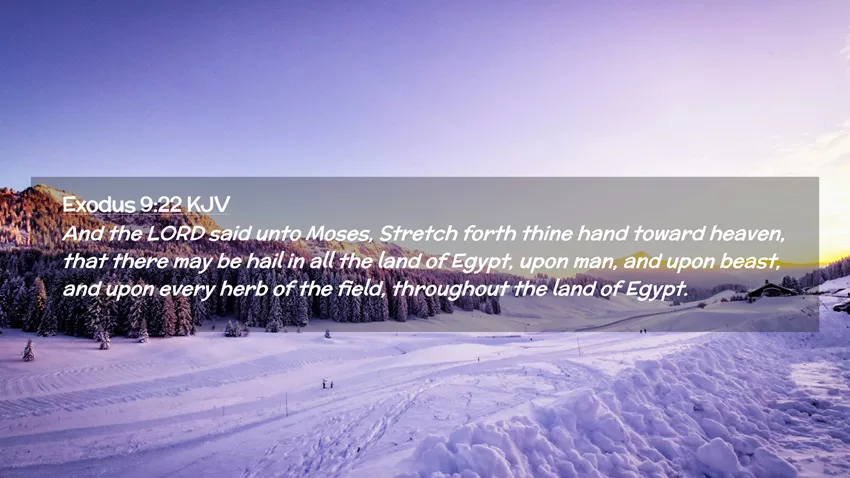Read the Daily Bible Verse – Exodus 9:22 To Strengthen Your Spiritual Journey.
Exodus 9:22, found in the King James Version (KJV), is a part of the dramatic narrative of the plagues that God brought upon Egypt to deliver His people, the Israelites. This verse reads:
“And the Lord said unto Moses, Stretch forth thine hand toward heaven, that there may be hail in all the land of Egypt, upon man, and upon beast, and upon every herb of the field, throughout the land of Egypt.”
This verse is rich in historical, theological, and practical significance. This article will explore its context, meaning, application in life, comparisons with other Biblical texts, modern-day relevance, and commentary, offering a comprehensive understanding.
The Context on Exodus 9:22 KJV
Exodus 9:22 is part of the narrative of the seventh plague—hail—sent upon Egypt. This event occurs within the broader story of the Exodus, where God, through Moses, confronts Pharaoh to demand the release of the Israelites from bondage.
The Sequence of the Plagues
The plague of hail is the seventh in a series of ten judgments God unleashes against Egypt. These plagues serve as signs of God’s power, justice, and sovereignty, directly challenging the false gods of Egypt.
Pharaoh’s Hardened Heart
Leading up to Exodus 9:22, Pharaoh repeatedly refuses to heed God’s command to free His people. The earlier plagues, including water turning to blood, frogs, and boils, demonstrate God’s might, but Pharaoh’s heart remains hardened.
The Specific Judgment of Hail
This plague introduces a new level of destruction. It targets not just humans but animals and vegetation, disrupting Egypt’s agricultural economy and showcasing God’s dominion over nature. This act further demonstrates that Egypt’s gods, who were believed to control the weather and fertility, are powerless.
The Exodus 9:22 Meaning
Divine Sovereignty
The command to Moses to stretch forth his hand symbolizes the divine authority vested in him as God’s chosen instrument. God orchestrates the events, using Moses’ actions to display His omnipotence.
A Call to Recognition
The plague of hail, like others, is designed to compel Pharaoh and the Egyptians to acknowledge the one true God. Each plague progressively undermines Egypt’s reliance on its gods and its ruler’s claims of divinity.
Judgment and Mercy
While the plague demonstrates God’s judgment, it also reflects His mercy. Before the hail falls, God warns the Egyptians to bring in their livestock and servants for protection (Exodus 9:19). This warning illustrates God’s desire for repentance and preservation of life.
Exodus 9:22 Application in Life
Trusting God’s Power
This verse reminds believers of God’s unmatched authority. It reassures us that He is in control, even in the most dire circumstances, and that His plans will ultimately prevail.
Obedience to God’s Commands
Moses’ role in this passage emphasizes the importance of obedience. Believers today can learn the value of trusting and acting upon God’s instructions, even when the task seems daunting.
God’s Justice and Compassion
The interplay of judgment and mercy in this passage offers a lesson on God’s character. As Christians, we are called to uphold justice while showing compassion, reflecting God’s nature in our daily lives.
Comparison with Other Biblical Texts
Similar Instances of Divine Judgment
Exodus 9:22 parallels other biblical moments of God’s judgment:
The Flood (Genesis 7): Like the hail, the flood was a natural disaster that served as divine judgment on humanity’s sin.
Sodom and Gomorrah (Genesis 19): The destruction of these cities by fire and brimstone also demonstrated God’s authority over creation and His intolerance of sin.
Foreshadowing Christ’s Power
The plagues, including the hail, foreshadow the miracles of Christ. Just as Moses stretched forth his hand to command nature, Jesus calmed the storm (Mark 4:39), demonstrating His divine authority.
A Warning Against Idolatry
Exodus 9:22 reminds readers of the futility of trusting in false gods. This theme is echoed in 1 Kings 18, where Elijah confronts the prophets of Baal, demonstrating that the God of Israel is the only true deity.
Modern-Day Relevance
Understanding Natural Disasters
In contemporary times, natural disasters often prompt theological reflection. Exodus 9:22 reminds us to view such events through the lens of God’s sovereignty and His purposes.
The Call to Repentance
The warning preceding the hail serves as a timeless reminder of God’s patience. Even in judgment, He provides opportunities for repentance—a principle that remains relevant in evangelism and personal reflection.
God’s Sovereignty in Crisis
Believers today can draw comfort from knowing that God is in control. In moments of crisis or uncertainty, Exodus 9:22 reassures us of His ultimate authority and purpose.
Conclusion
Exodus 9:22 is a profound verse that reveals God’s power, justice, and mercy. It challenges readers to trust in His sovereignty, heed His warnings, and live obediently. The narrative of the plagues serves as a reminder that God is supreme over all creation, and His plans cannot be thwarted.
By understanding the context, meaning, and application of Exodus 9:22, believers can gain deeper insight into God’s character and find encouragement in His unwavering faithfulness. This verse continues to inspire reverence for God and calls us to align our lives with His divine will.
Exodus 9:22 Commentary
The Role of Moses
Moses’ obedience in stretching forth his hand signifies his faith and submission to God. It reflects the dynamic partnership between divine power and human responsibility.
The Universal Scope of the Plague
The phrase “upon man, and upon beast, and upon every herb of the field” highlights the comprehensive nature of God’s judgment. It reminds us that sin’s consequences are far-reaching.
Theological Implications
Exodus 9:22 underscores God’s ability to use creation as a tool for His purposes. It also serves as a prelude to the ultimate deliverance of His people, pointing toward Christ’s redemptive work.
Related topics:


